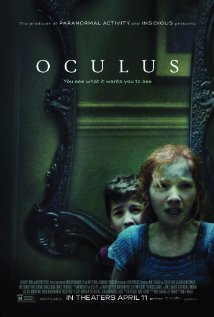Horror, 104 Minutes, 2014
Oh smart horror, how I love you! You creepy, demented thing getting all up in my brain and making me think! Smart horror is always in short supply, so when it make an appearance, fans should always pay attention.
The movie tells two stories; essentially acting as its own sequel. The stories bolster one another beautifully in a classical “right brain/left brain” way that left me deeply satisfied.
An extended series of flashbacks details how a mysterious mirror destroyed the lives of an otherwise normal suburban family 11 years ago. We watch parents Katee Sackhoff [IMDB] and Rory Cochrane [IMDB] deteriorate in front of their terrified children, played by Annalise Basso [IMDB] and Garrett Ryan [IMDB].
These segments are primarily from the children’s point of view. They are highly charged and almost purely emotional. Sackhoff and Basso’s mother/daughter performances are particularly heart-wrenching. The horror is primitive and instinctual as we watch the terrified children try ineffectually to exert control over their situation.
The main story follows the now grown children. One, Karen Gillian [IMDB], is convinced that those terrible events were caused by the mirror. She has researched its history and believes she’s discovered a system to beat it and exonerate her father.The other, Brenton Thwaites [IMDB], has spent the intervening years institutionalized under intensive therapy. He’s been convinced that their childhood minds invented the mirror’s evil as a way to understand their father’s mental illness.
This story is deeply intellectual. It sets the parameters of engagement through a breathless recounting of the mirror’s past victims and the plan to beat it. Cameras, timers, traps and counter-measures are all laid out and explained. The plans may not be the best possible, but the fact that you’ll make a decision on that score means the movie has already caught you.
The horror here stems from the cat-and-mouse play between the mirror and its potential victims. It juxtaposes the agonizing impotence of the children in the past with the cold calculation and preparation of the present. Gillian’s passionate single-mindedness is infectious and the Mirror’s mind games leave the audience constantly off-balance.
My only minor complaint is that the ending did seem rather abrupt. It also fell solidly on the predictable end of the spectrum. Honestly, however, the movie had to end. None of the potential outcomes would have been wholly satisfying and many would have been significantly worse.
The movie puts me in a difficult position. Part of me hopes for future installments, either prequels or sequels, that expand on the history and legend of the mirror. Another part fears this because any additional stories could so easily fall to mediocrity and cliche. I suppose that’s a question for the future. For now I’m just going to be happy the smart horror still exists.

